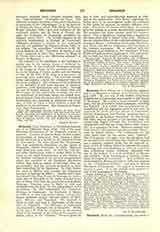

Betanzos, FRAY DOMINGO, a Dominican missionary, d. at Valladolid, September, 1549. One of the most illustrious Dominicans of the sixteenth century in America. A native of Leon in Spain, he first studied jurisprudence at Salamanca, then became a Benedictine and lived as a hermit on the Island of Ponza for five years. He then joined the Dominicans, who had established themselves on the Island of Hispaniola (Santo Domingo) in 1510. Betanzos went there four years later. In 1516 he, with several other Dominicans, wrote a violent letter to Las Casas on the rapid disappearance of the Indians of the Antilles, indulging in the grossest exaggerations about the numbers of the aboriginal population (which they had no means of knowing, even approximately), and the excesses purported to have been committed by the Spaniards. In 1526, Betanzos went to Mexico and founded the Dominican province of Santiago de Mexico. Hardly had it been established when Fray Tomas de Berlanga set forth a claim that it belonged to his newly founded province of Santa Cruz with the provincial seat at Santo Domingo. Betanzos went to Spain in 1531 and obtained from the Holy See the independence of his foundation. He also established the Dominican Province of Guatemala. As Provincial of Mexico in 1535, he at once organized missions among three Indian linguistic stocks: Nahuatl (Aztec, or Mexican), Mixteco, and Tzapoteco. He returned to Spain in 1549, and died in September of the same year at Valladolid. The Bishopric of Guatemala was tendered to Betanzos, but he declined it. While, in his letter of 1516, he acquiesced in the extreme views of his brethren of the order on the question of Indian policy, in the “Opinion” (Parecer) given by him in 1541, and approximately repeated in 1543, just as the unfortunate “New Laws” regarding the Indies were to be promulgated under the influence of Las Casas, he assumed an entirely different attitude. Free from all controversial spirit, he quietly gave his opinion in a sense diametrically opposed to the measures Las Casas pressed upon the Government. This is significant, coming from a member of the same order and of almost equal rank. Betanzos was an intimate friend of the most distinguished Franciscans of Mexico—Archbishop Zumarraga, Motolinia, and others, who did not harmonize with Las Casas in his extreme tendencies. He is credited with the authorship of an addition to the “Doctrina” of Fray Pedro de Cordova which appeared in 1544, and possibly in 1550, but this is not yet fully established.
AD. F. BANDELIER

